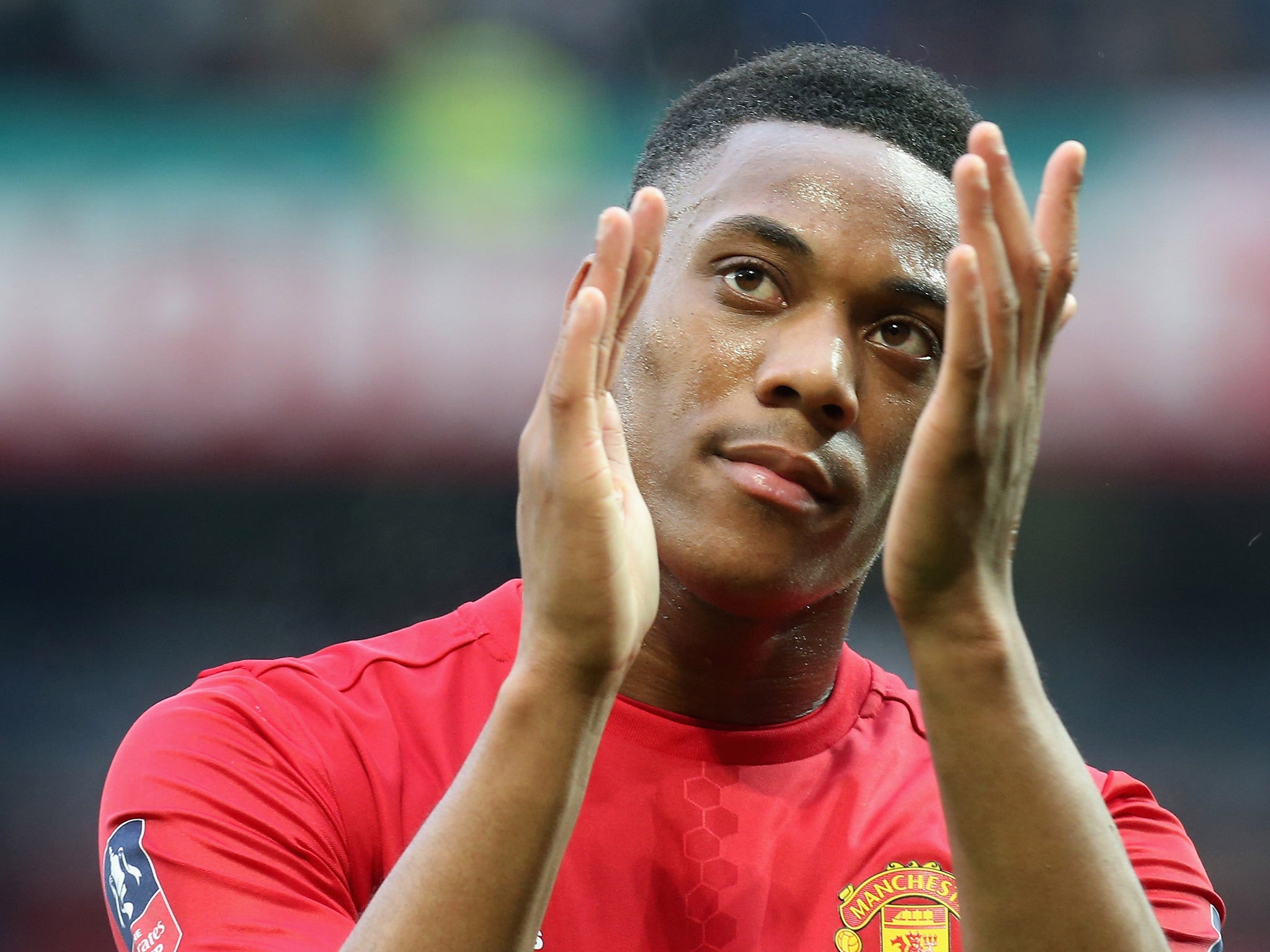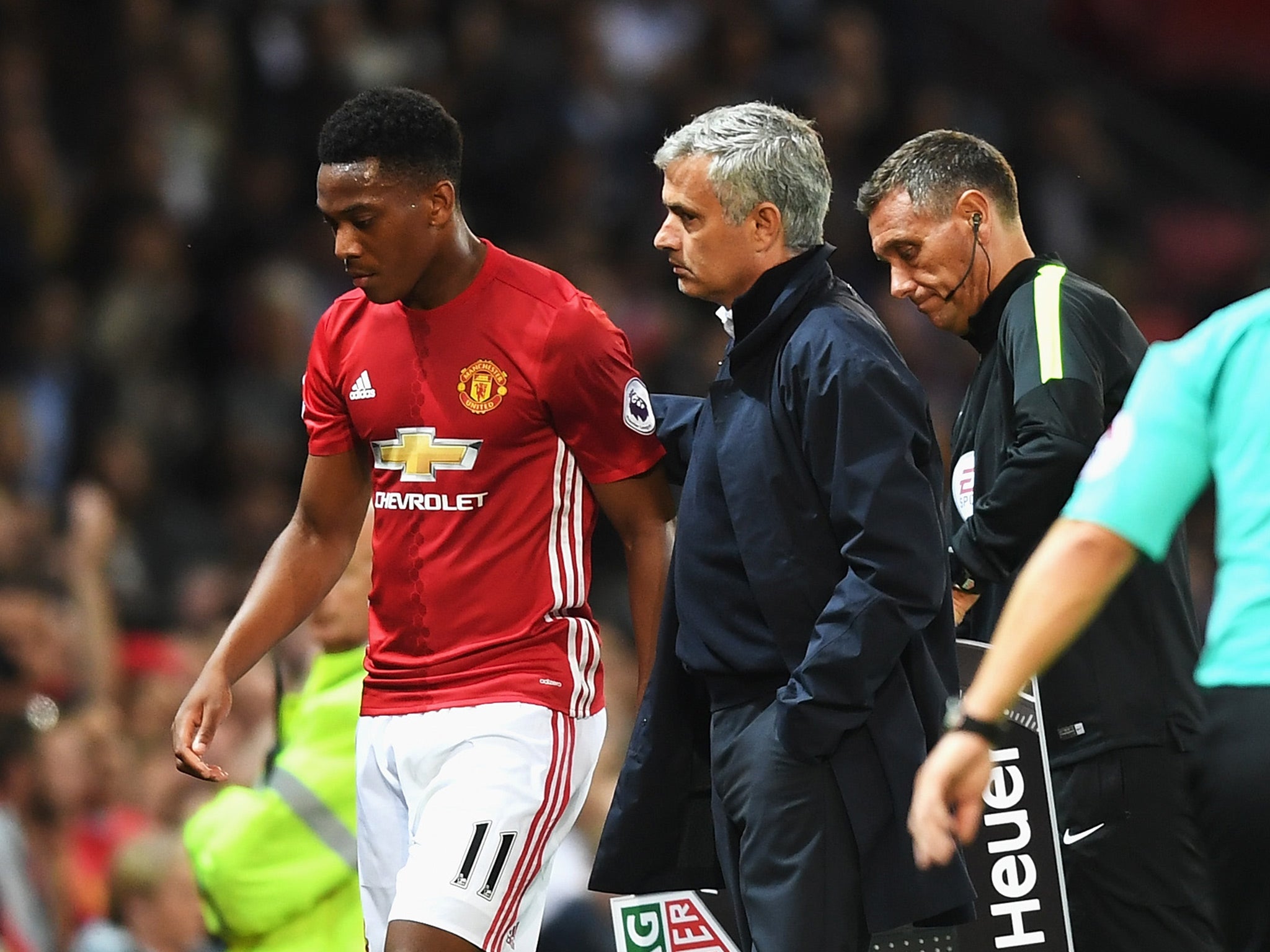As Anthony Martial teeters on the brink of a Manchester United exit, is he or Jose Mourinho to blame for his demise?
We are not seeing the best of United's best player last season. Is he at fault, or is he a victim of his manager's methods?

Your support helps us to tell the story
From reproductive rights to climate change to Big Tech, The Independent is on the ground when the story is developing. Whether it's investigating the financials of Elon Musk's pro-Trump PAC or producing our latest documentary, 'The A Word', which shines a light on the American women fighting for reproductive rights, we know how important it is to parse out the facts from the messaging.
At such a critical moment in US history, we need reporters on the ground. Your donation allows us to keep sending journalists to speak to both sides of the story.
The Independent is trusted by Americans across the entire political spectrum. And unlike many other quality news outlets, we choose not to lock Americans out of our reporting and analysis with paywalls. We believe quality journalism should be available to everyone, paid for by those who can afford it.
Your support makes all the difference.If Anthony Martial was frustrated to be left out of the Manchester United team before Wednesday’s 0-0 draw with Hull City, the wonder is what he was thinking after the game. This was a night when the side’s poor goalscoring record was again highlighted, and Zlatan Ibrahimovic even publicly bemoaned their finishing, all as one of the world’s most promising attacking talents was left sat on the bench.
It could fairly be argued that Martial hasn’t been too productive himself this season, but then his two goals have come in only 711 minutes of football, and they mean it isn’t difficult to know what Jose Mourinho is thinking. The United manager has made it explicit by so frequently leaving Martial out, and added an implicit edge to such decisions with his Friday press conference.
Mourinho spoke about “the pressure to win”, and how some players “need that time to go out of their comfort zone or a zone where they are protected that we assume the objective is not to win”.
It’s obviously open to debate whether Martial was one of those the Portuguese was referencing, but what is beyond debate is that Mourinho doesn’t think he’s getting the response out of the French international that he would want. He hasn't shown his talent in the way that made the manager want to sign him for Chelsea back when the player first went to United.
Martial would justifiably feel that two fine assists when finally called upon against Wigan Athletic in the FA Cup were an appropriate reaction to the manager’s demands for a better performance, but he still wasn’t “magnificent” in the way Mourinho wanted. Either way, it has created an issue, and led to fairly open debate about the future of a young star with the talent to be one of the best in the world.
Those close to the United hierarchy say Mourinho is starting to doubt whether he can quite “get into Martial’s head” in the same way he did with Henrikh Mkhitaryan. The Portuguese referenced this in December, pointing to how Mino Raiola trusted his initial hard-line treatment of the Armenian, while saying that Martial “needs to listen to me, not his agent”.
“He needs to listen to me in training, where I try to improve the players.”
Sources in the United set-up say it is true Martial could sharpen up when it comes to the manager’s instructions. He is also seen as a bit of individualist within the squad, and occasionally appears more into his music than football. The contrasting example of Marcus Rashford has been pointed out, and how he has been so willing to learn and do things that he didn’t last season.
Clearly, Martial hasn’t yet completely immersed himself in Mourinho’s method of management in the way the Portuguese’s best players have; in the way that has really fired Mourinho’s best teams.
From that, though, there is a natural debate over whether that vintage approach is best for all players. It almost comes to the question over whether certain young talent is worth a bit more leeway, something a bit different.
He needs to listen to me in training, where I try to improve the players.
Mourinho has spoken in the past about how he uses “confrontational leadership”, especially when he is first getting to know players and teams. That, as he put it, is “basically when you are ready to provoke your players, to try to create some conflict with the intention to bring out the best from them… to provoke a reaction from him of anger.”
Mourinho would then make decisions on how players responded, how willing they were. He was effectively conditioning the squad into a fiercely committed team, and it admirably created some immensely successful teams. It was an approach well articulated by Arjen Robben, who was at a similar age to Martial now, and played in a similar role, when he worked with the Portuguese at Chelsea between 2004 and 2007. “You have to jump on the train with him or … you’re off.”
It’s just that isn’t necessarily the best for all young talent, especially those in the creative roles that will inevitably see more inconsistency at an early age. As one former Premier League star privately told the Independent this week, “Mourinho wants young players to fight their way in, but some young players will only learn how to fight by playing regularly”.

Then there is the issue of the exact tracks Mourinho wants them to go on, and whether this suits a player like Martial too. Only this week, Chelsea’s Eden Hazard revealed Antonio Conte looks to tactically co-ordinate his team so much more.
“With Mourinho,” the Belgian said, “he put in a system but we didn’t work lots. We know what to do because we play football, but maybe the automatisms were a little bit different.”
In other words, as has commonly been argued about Mourinho, he puts in a defensive structure but largely leaves the forwards free when it comes to attacking. It was something else the Portuguese has effectively revealed himself. When talking about his concept of the ideal playmaker back in November 2015, he spoke a lot about the amount of work they have to do off the ball. “I demand a lot from a number 10.”
Is this part of the issue with Martial? Is he a thoroughbred talent who requires freedom from defensive responsibility yet more modern tactical instruction when attacking, but is instead getting defensive instruction and then left responsible for himself in a limited area of attack?
Others near the United set-up have argued that Martial needs to earn that right, and that Mourinho has allowed creative players to take more chances and indulged them when they have first shown him they will follow his instructions.
All of that is open to question right now. What is not open to question is that we’re not seeing the best of last season’s best United player right now, or much of him at all.
It is possible this may change. Martial may well respond in precisely the manner Mourinho wants, and it shouldn’t be forgotten that the manager has himself positively changed his mind on a few United players this season, from Michael Carrick to Marcos Rojo.
It’s just that this is all the more conspicuous when the team aren’t taking their own chances.
Join our commenting forum
Join thought-provoking conversations, follow other Independent readers and see their replies
Comments